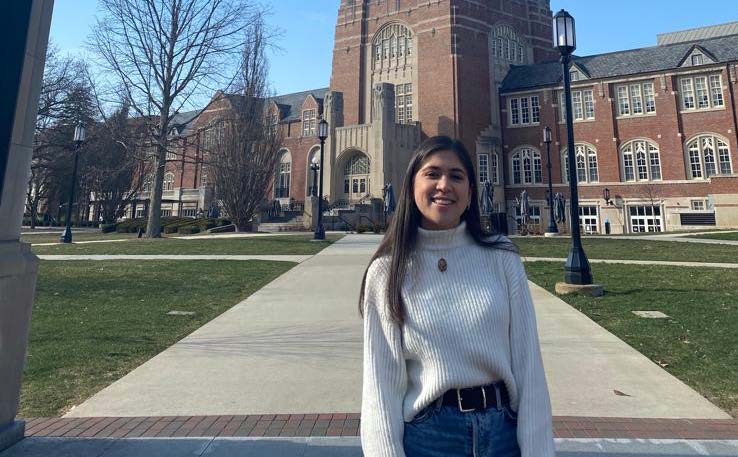
With the aim of improving health with the selective stimulation of microorganisms, Mariana Guzmán Sánchez, a graduate of Bioproduction Engineering and Agro-industrial Production Engineering, participated in the construction of a mathematical model to predict and simulate microbial interactions, a project derived from her international internship in the Department of Food Science at the Diet-Microbiome Interactions Lab of Purdue University (United States), thanks to the Undergraduate Research Experience Purdue - Colombia (UREP-C) program.
The research, entitled Insights into gut microbial interactions: mathematical modeling of inulin consumption as carbon source, aims to understand the preferences of gut microbiota bacteria according to the substrates available in the organism. Thus, it is possible to know that microbes have different preferences and, by understanding this, methods are developed to selectively stimulate the growth and activity of those that benefit human health.
"I was working with three different bacteria. I cultured them in two different media, in aerobic and anaerobic conditions, testing five carbohydrates as a single carbon source," says Guzmán Sánchez. While the research yielded results during the six-month exchange, it is a process that is still under construction. "We found that certain bacteria prefer some substrates over others. Bacteria prefer more complex molecules (such as sucrose or ketose) over glucose and fructose, because they are energetically more favorable for them," adds Mariana.
The intestinal microbiota is directly linked to digestive, skin, mental and immune system health. Therefore, "The more we know about the microbiota, the more tools we have to take care of people's overall health. If we understand how to make the good microorganisms grow more, we will be able to offer food solutions, because that is what Food Science focuses on: providing, developing and generating foods that allow us to maintain the health of our microbiota," says Guzmán Sánchez.
For example, "Many people have heard that you have to eat fiber because it is good, but some do not understand what it is or where it comes from. So, I do research precisely to provide people with more specific and simple indications to take care of their health," she explains.
This experience gave her insight into how a real research work environment works. "I learned how to plan, design and evaluate experiments, based on the guidance of graduate students, my own literature review and what I learned. I had the privilege of attending seminars, conferences and active cultural workshops, related to my research topic and how to conduct it," says the student.
After graduation, Mariana plans to return to Purdue University to continue working on research. "I was invited to continue contributing and, soon, I will also be applying for a master's degree there. The personal and professional growth is beyond words. I am immensely grateful," she concludes.
Note published in Campus periódico - Universidad de La Sabana
